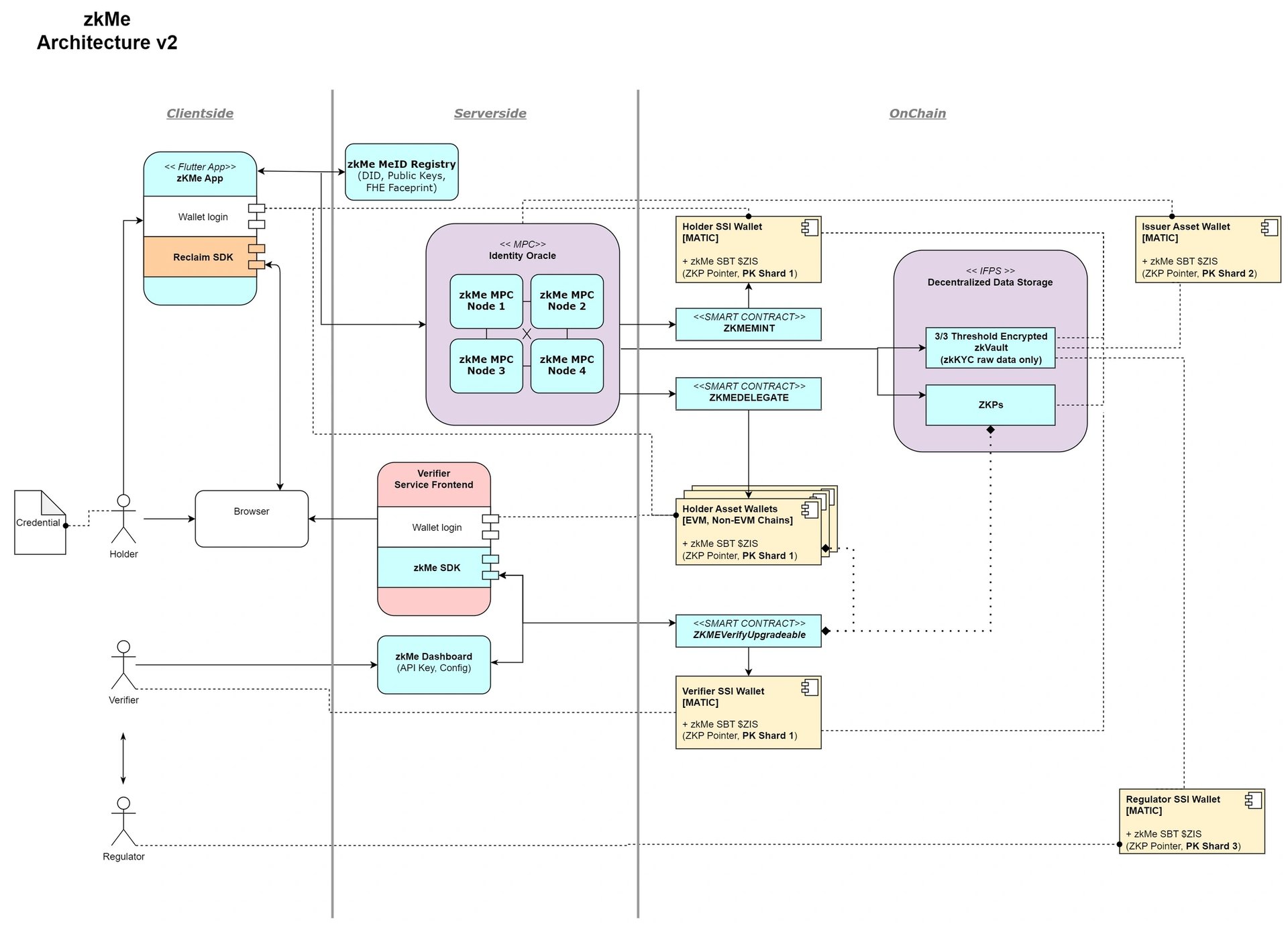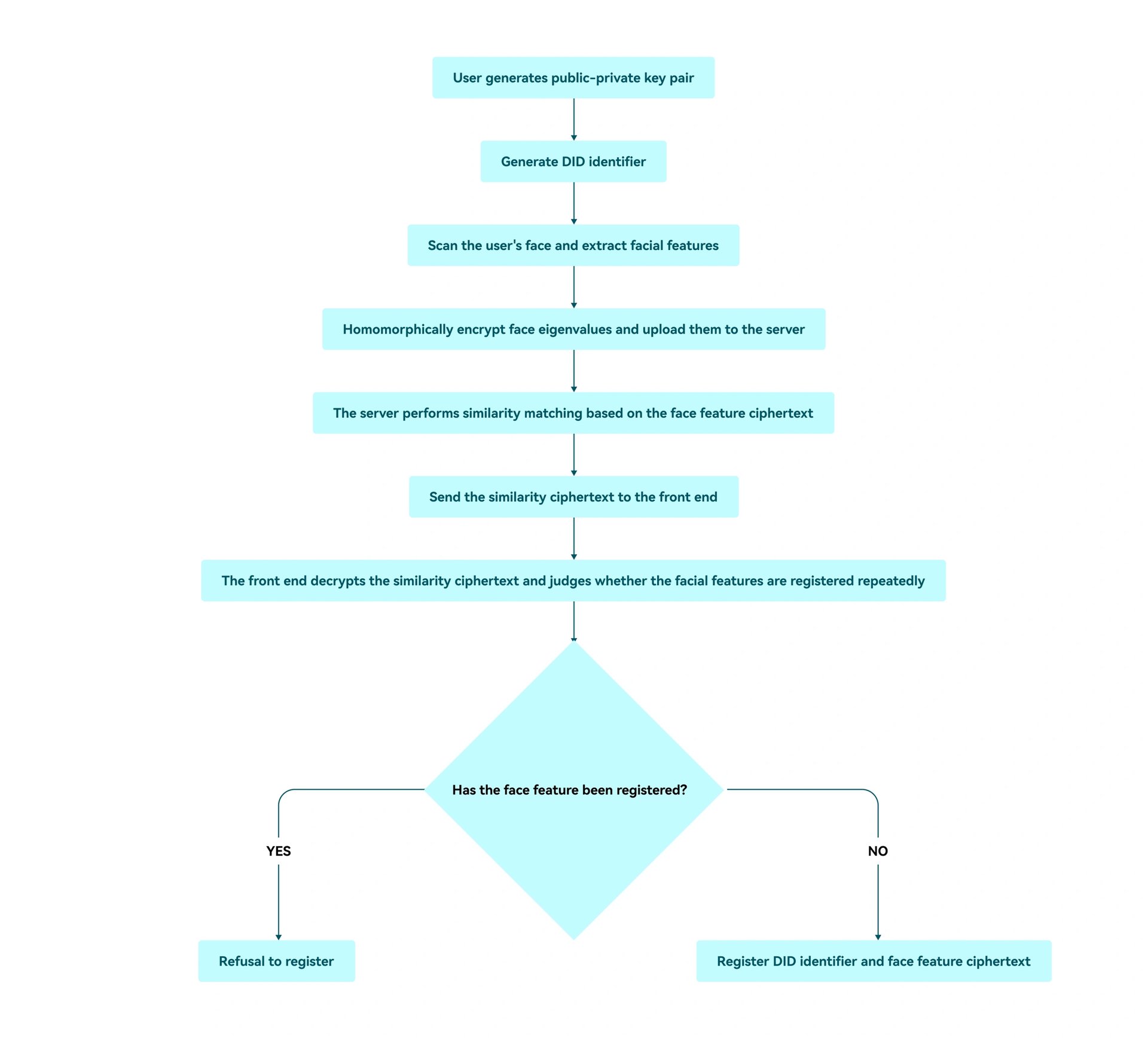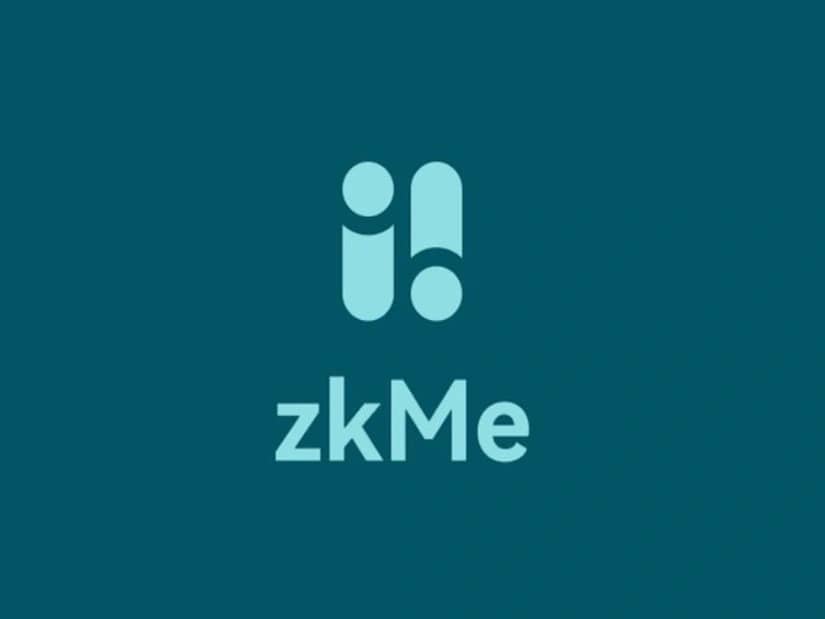Subscribe to wiki
Share wiki
Bookmark
zkMe
We've just announced IQ AI.
zkMe
zkMe develops a platform that upholds compliance standards in DeFi through zero-knowledge Identity Oracles, aligning with Web3's principles of decentralization and privacy. The platform focuses on constructing a decentralized Identity Oracle, facilitating secure on-chain credential verification while preserving user privacy. By leveraging zero-knowledge proofs (ZKPs), zkMe enables KYC verification and other credential-related services securely and anonymously. [1]
Overview
Founded in December 2022, zkMe Technology Limited develops Identity solutions for decentralized finance (DeFi), enabling compliance and privacy through zero-knowledge proofs. Their Identity Oracles allow users to prove eligibility without revealing their Identity, bridging trusted credentials from traditional finance and the internet to blockchain ecosystems. This infrastructure supports secure, permissioned DeFi for institutions and users, ensuring data privacy and control over digital identities. [1]
On May 29th, 2023, zkMe closed a $2M pre-seed round with participation from Circle Ventures, Spartan Group, CMS Holdings, Fenbushi Capital, NGC Ventures, and Arkstream Capital. [2]
Technology
zk-SNARK
zkMe employs Zero-Knowledge Succinct Non-Interactive Argument of Knowledge (zk-SNARK) technology to create proofs (ZKPs) that convey the Holder's identity without revealing sensitive data. These proofs run directly on the Holder's device, providing only anonymized results (yes/no statements) to Verifiers. This strategy enhances privacy and security by limiting data exposure and ensuring sensitive information remains confidential. [3]
Key tools for zkMe's implementation include SNARK JS and Circom. SNARK JS, a JavaScript library, handles ZKP generation and verification using various proof systems like Groth16 and PLONK. Circom, a domain-specific language (DSL), facilitates the creation of circuit constraints for ZKPs, enabling developers to write constraints efficiently and generate ZKPs seamlessly. [3]
zkMe utilizes the Groth16 algorithm, which necessitates a trusted setup to generate a common reference string (CRS) for each statement or circuit. Once established, this CRS can prove various statement instances over the system's lifespan. The Groth16 setup entails a multi-party computation ceremony to ensure ZKP system security, relying on at least one honest participant for its integrity. [3]
zkMe Architecture

zkMe App
The zkMe App is a secure, decentralized SSI wallet that uses MPC cryptography to store and manage anonymized identity information, including VCs from trusted entities. This allows for identity or attribute proof without revealing personal data. MPC distributes private keys across multiple devices or nodes to reduce unauthorized access risk. The app includes OCR and facial recognition for mobile credential verification, enhancing security, and limiting data sharing. Users are screened against criminal, terrorist, or PEP lists to identify potential risks. [4]
Verification proofs, in the form of Soulbound Tokens (SBT), are minted from the SSI wallet and accessed via the zkMe App or Widget onto the user's asset wallet, which is typically self-custodial and used to interact with web3 dApps. If a user participates in multiple chain ecosystems, an SBT copy is minted for each to ensure a seamless experience. zkMe uses zk-SNARKs to generate anonymized Zero-Knowledge Proofs (ZKPs) representing the user's identity without disclosing sensitive data, ensuring privacy and security. [4]
zkMe Widget
The zkMe Widget is a JavaScript SDK that enables developers to integrate credential verification features into their applications, providing libraries and APIs for interaction with the zk-credential network. Designed for desktop browsers, it allows seamless user verification through the user interface and offers mobile QR codes for secure interaction with Web3 services. The zkMe SDK provides a user-friendly verification method, enabling verifiers to validate presented proofs (SBTs in the user's asset wallet) via the zkMe web API, smart contracts, or by prompting users for new proofs through a pop-up window. [4]
zkMe Dashboard
The zkMe Dashboard is designed for dApp user eligibility checks, allowing verifiers to create "Verification Profiles" with specific business requirements like age or geographic restrictions. It offers tools for streamlining KYC processes, customizable verification criteria, analytics, and reporting. Configurable API keys enable developers to integrate their Web3 dApps with the zkMe Credential Network, ensuring compliance and a smooth user experience. [4]
zkMe OpenAPI
The zkMe OpenAPI allows developers to integrate credential verification processes into their applications, supporting secure user interactions and compliance with privacy standards through RESTful services. It offers API documentation for KYC and KYT procedures, including endpoints for checking API status, compiling user lists, accessing KYC information, managing address labels, and conducting risk assessments and transaction analyses. The OpenAPI provides tools for authentication using merchant numbers and API keys, detailing request structure and rate limitations to maintain system integrity and performance. [4]
zkMe zkVault
The zkMe zkVault is a Verifiable Data Registry that utilizes IPFS-based decentralized storage to prevent single points of failure and unauthorized access. Single ZKPs within a Holder's SBT are stored for proof reusability and tamper resistance. When required by law, additional threshold encryption is used for raw identity document encryption, requiring multiple parties for encryption and decryption, enhancing security. Original identity documentation is stored with 3-out-of-3 threshold cryptography and split private keys to ensure maximum privacy and regulatory compliance. [4]
zkMe Smart Contracts
zkMe developed smart contracts for decentralized verification, allowing the protocol and Verifiers to process verifications autonomously. zkMe Mint and Delegate contracts mint original and delegate copies of DIDs onto Holder's wallets. zkMe Verify and Certify contracts enable Verifiers to interact with the zkMe network and request the minting of a special SBT copy for legal data access if necessary. These functionalities are also accessible through zkMe APIs for non-Web3 native Verifiers. [4]
- The zkMe Mint smart contract anchors verified credentials and their anonymized presentations on-chain.
- The objective of the zkMe Delegate Smart Contract is to provide copies of the user's on-chain Identities across the chain ecosystems where the user is active.
- The zkMe Verify & Certify Smart Contract (ZKMEVerifyUpgradeable) serves multiple functions, including verifying users' eligibility for services and meeting data recovery obligations to comply with regulatory requirements. This smart contract is activated when a decentralized application (dApp) detects a Soulbound Token (SBT) asset in a Holder's wallet.
zkKYC
zkMe zkKYC empowers users to verify their identity to a service provider without disclosing personal information, enhancing privacy and security compared to traditional eKYC solutions. This approach aids service providers in meeting regulatory KYC obligations while mitigating the risks associated with data breaches, identity theft, and verification expenses. [4]
In the Web3 ecosystem, traditional KYC processes can be challenging to implement due to their reliance on collecting and storing personal data, which conflicts with the principles of decentralization and data autonomy. However, ZKPs-based KYC offers a solution by allowing businesses to verify users' identities without compromising their privacy or the decentralized nature of the ecosystem. This approach addresses key business requirements, including privacy protection, regulatory compliance, security enhancement, efficiency improvement, and user experience enhancement. [4]
With ZKPs-based KYC, businesses can verify users' identities without requiring them to disclose personal information, thus safeguarding their privacy. Moreover, it enables compliance with regulatory requirements such as AML and KYC regulations while maintaining the decentralized nature of the ecosystem. By enhancing security and reducing the risk of fraud, ZKPs-based KYC contributes to a safer environment for users and businesses. Additionally, it improves efficiency by streamlining the identity verification process, ultimately enhancing the user experience by providing a seamless and user-friendly interaction with Web3 applications and services. [4]
Self-Sovereign Identity (SSI)
Self-Sovereign Identity (SSI) presents a novel approach to address privacy concerns and identity misuse by granting individuals full control over their digital identities, unlike traditional systems dominated by organizations. With zkMe's SSI model, users can create and manage verified digital IDs or credentials within a secure digital wallet, ensuring sole ownership and control. This system allows users to selectively share data, determine recipients, and set expiration periods, enhancing privacy and control. Unlike conventional eKYC methods involving PII sharing, zkMe utilizes zero-knowledge proofs to generate mathematical attestations about credentials without exposing actual data. For example, zkMe users can verify age eligibility without disclosing birthdates or other sensitive PII, ensuring privacy while meeting verification requirements. [5][6]
MeID
The "one face, one digital identity" principle helps prevent automated scripts and Sybil attacks by using zkMe's facial recognition for identity verification. This process assigns each user a unique digital identity (DID), making it difficult for malicious actors to create fraudulent accounts. This method ensures businesses interact only with legitimate human participants, protecting them from the risks of inauthentic entities. [7]
CKKS Homomorphic Encryption
The CKKS algorithm, proposed by Cheon et al. in 2017, is a fully homomorphic encryption (HE) scheme designed for encrypted computations involving complex and real number data. It offers high computation accuracy and minimal ciphertext expansion, making it widely used in homomorphic encryption. This scheme protects users' facial feature data using homomorphic encryption during registration, where facial features are extracted with liveness verification, encrypted, and uploaded to the server. The server compares these encrypted features and sends back a similarity ciphertext for decryption and verification. If features are unregistered, the DID identifier and encrypted facial features are stored to complete registration. Homomorphic encryption allows secure computations on encrypted data, while liveness verification prevents fake account registration using others' photos, ensuring user privacy and secure DID creation. [8]

MeScores
zkMe's identity oracle allows users to bring personal data, like credit scores and social network statuses, to the blockchain. Web3 protocols can then use this data to create tailored features, such as determining loan eligibility in DeFi or recommending content on social networks. This enables a more personalized and efficient digital experience for users. [9]
Partnerships
Integrations
- Aptos
- Arbitrum One
- Base
- BNB Smart Chain
- Eclipse Fi
- Ethereum
- GateWallet
- Manta Network
- Neutron
- Particle Network
- Polygon
- Ronin
- Solana
YOIU
On June 3rd, 2024, zkMe partnered with YOIU, an IDO platform connecting early adopters with innovative AI and blockchain startups. Through this collaboration, YOIU integrated zkMe’s zkKYC solution and AML Screening into its platform, providing users with a seamless and secure KYC and AML experience while ensuring compliance. [10]
Xion Global
On May 28th, 2024, zkMe announced a strategic partnership with Xion Global, a blockchain-based payment platform on the Polygon network. Xion Global integrated zkMe’s zero-knowledge identity oracles into its payment ecosystem, enabling seamless and secure Know Your Customer (KYC) and Know Your Transaction (KYT) processes for its users. [11]
Data Ownership Protocol (DOP)
On May 24th, 2024, zkMe announced a partnership with Data Ownership Protocol (DOP), a platform for decentralized operations. This collaboration integrated zkMe’s advanced identity verification and management services into DOP, providing users with enhanced security, privacy, and compliance features. [12]
Impossible Finance
On May 17th, 2024, zkMe announced a strategic partnership with Impossible Finance, a pioneering decentralized finance (DeFi) platform. Through this collaboration, Impossible Finance is utilizing zkMe’s advanced identity solutions to enhance compliance and security. [13]
Hinkal Protocol
On May 10th, 2024, zkMe announced a strategic partnership with Hinkal to enhance blockchain anonymity and security. This collaboration integrates zkMe’s identity solutions with Hinkal’s zk-protocol, adding zkKYC and AML screenings to prevent unauthorized access and ensure secure, confidential transactions. [14]
StationX
On April 17th, 2024, StationX, a global capital coordination protocol, announced the adoption of zkMe’s KYC toolkit atop their existing infrastructure, ensuring a secure and verified user environment. StationX facilitates the creation of on-chain special purpose vehicles (SPVs) to pool capital seamlessly and deploy as a single entity. The native integration with zkMe guarantees user identity privacy and security by pioneering zero-knowledge proofs (ZKPs) while ensuring compliance with evolving financial regulations. [15]
The Guild
On March 22nd, 2024, THE GUILD, a blockchain-based platform focused on reshaping the gig economy and freelance work, announced a strategic partnership with zkMe, integrating its anti-Sybil and anti-bot technology into their SocialFi platform. This collaboration signifies a commitment to integrity, ensuring the security of transactions and the community's fabric. [16]
MistTrack
On December 20th, 2023, zkMe announced a partnership with MistTrack, an advanced Know-Your-Transaction system by SlowMist. This partnership marks a substantial advancement in zkMe's endeavor to safeguard user identities' privacy and security within the blockchain realm, all while upholding stringent compliance with burgeoning regulations. [17]
Dextr
On November 22nd, 2023, zkMe announced a collaboration with Dextr, an innovative non-custodial exchange built on account abstraction technology. This partnership represents a stride in zkMe's commitment to enhancing cryptocurrency user identity privacy and security. [18]
Hippocrat
On November 3rd, 2023, Hippocrat, an emerging online medical resource, announced its collaboration with zkMe to implement privacy-preserving credentials, ensuring a secure environment for its medical advice platform. Additionally, zkMe's identity oracle may be utilized to verify medical licensing, enhancing trust and safety for users accessing medical information. [19]
GasZero
On August 29, 2023, GasZero and zkMe collaborated to offer a highly efficient oracle and KYC service, setting a new standard in the market. This collaboration also hinted at the possibility of expanding their oracle services. [20]
Mantle
On July 10th, 2023, zkMe integrated its zk-proof credential verification and identity oracle with Mantle Network’s scaling infrastructure. This partnership addressed the regulatory landscape, focusing on decentralization, privacy, and security. Combining zkMe’s credentials with Mantle Network’s rollup architecture enabled a new class of identity solutions for DeFi platforms, social applications, and more, preserving user privacy while ensuring high performance. The Identity Soulbound Token encapsulated identity information like age, address, and qualifications in a privacy-preserving manner. [22]
Linea
On July 4th, 2023, zkMe partnered with Linea to introduce the Identity Soulbound Token on the Linea network. This collaboration aimed to provide a transformative solution for identity verification, addressing key issues in current methods. The Identity Soulbound Token enabled users to complete anti-bot, and Sybil checks quickly on the Linea network without needing to connect a wallet, allowing users to benefit directly from their identity data. [23]
ZetaChain
On June 15th, 2023, ZetaChain partnered with zkMe to enable efficient and anonymous verification of user credentials across chain ecosystems. This partnership facilitated seamless, privacy-focused, interoperable identity verification in the decentralized world by leveraging zkMe’s zero-knowledge Identity Oracle and Omni Soulbound Tokens (Omni SBTs). Developed in collaboration with ZetaChain, zkMe’s Omni Soulbound Tokens represented verified user credentials that were non-transferable and could be used across all chains connected via ZetaChain’s Omnichain Approach. [21]
See something wrong?
